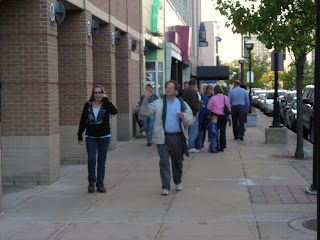During the course of this meeting, it occurred to me that some vital questions remain to be answered. What was the purpose of this Ordinance? Was it to improve quality of life for the community? Was it to reduce neighborhood blight? Was it to provide an additional source of revenue for a City Department? Was it to improve safety for the tenants? Lower crime in neighborhoods?
Throughout the course of this evening, these questions kept running through my mind, and my quest for the purpose of 1463 was still out of reach. No one in attendance seemed to know the answer. If it were any of the above questions, then it is clear that this ordinance has accomplished none of the above.
Historically, there was a rental property ordinance on the books prior to the introduction of this new one a little over two years ago. That was numbered 1460. It covered the registering of rental property, as does 1463, and many other points. However, 1460 was never enforced. Thus someone along the line seemed to come up with the idea that instead of enforcing what was in existence, they should just write a new one and apply more force to landlords as a solution for the prior lack of enforcement. It would seem the conclusion of the lack of enforcement of 1460 was the responsibility of the landlords themselves, thus 1463 needed to be drafted with stiffer penalties for landlords.
Do you follow the logic? It still does nothing for my quest for the purpose of 1463, but it does perhaps shed some light as to why it came into existence to begin with. The basic flaw of 1463 is its approach of placing exclusive responsibility for the condition of a rented property on the shoulders of the landlord.
Yes, the landlord does own the property, thus they share a responsibility inherently with property ownership for its condition, but because it is a rented property occupied by a person other than the landlord, there is also another party that shares a responsibility as well.
This person is called the ‘Tenant’. Their conduct and behavior affects the quality of life of neighborhoods. To deny them any responsibility in the condition places them squarely on the other side of the fence called ‘no-responsibility’. If you do this, then properties naturally continue to be damaged, neglected, and in some cases outright destroyed.
The ordinance gives them a golden crown of ‘no-responsibility’ and thus blight, disturbed neighbors, and crime continues. Having been a landlord for a few years, and having worked with landlords for several more, I can personally testify to the fact that tenants do not always treat your property as you would wish it to be treated. Nor do they always conduct themselves with courtesy to neighbors, or have a general regard for the curb appeal of the place they are living in.
In fact, there are percentages that strictly speaking do not know how to live in houses. It is a sad situation, but it is even a sadder situation when a city government seeks to blindly solve a problem by addressing only one side of the problem they are trying to solve. Resolving the proper treatment of rental property by tenants also needs to be a part of the equation. That is what has been lacking from 1463, and thus it never resolves the problem of blight in the neighborhoods, reduction of crime or improvement of the quality of life.
At the meeting I suggested the idea that tenants too need to be required to be certified if this ordinance were going to improve the quality of life in our community. Why should this be considered such a radical idea? Couldn’t a basic course be developed that all tenants are required to pass? It could cover curb appeal, courtesy to neighbors, noise ordinance regulations, the definition of blight, how to operate appliances, electrical fixtures and plumbing correctly, house cleaning, healthy living environments, etc.
If this cannot be addressed in the ordinance, then the entire ordinance as it stands needs to be done away with and just let it expire. To place the sole responsibility of the tenant’s conduct on the shoulders of the landlord is not practical and never was. It may have sounded like a good theory on paper, but after a two year test, it has only resulted in driving property investors out of the city, unjustly penalized existing landlords, and the conduct of tenants have not improved.
It was stated by some in attendance the other night that 1463 is a failure. I would tend to agree with that statement. Creating a ordinance that seeks to regulate the lives of individuals and business owners that does not include everyone involved in the relationship is too one sided and doomed to failure.
Some also argued that if the City it to require property improvements for safety of the occupants, what about the single family homes in the same neighborhood? Do they not also pose the same risk to the occupants? Being a Realtor in Battle Creek, I have been in many homes that had hazardous conditions, and this potential situation involves all homes, not just rentals.
















